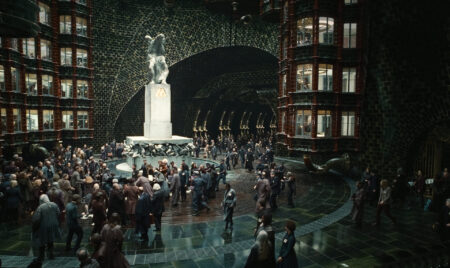“Bambai Meri Jaan,” a 10-episode web series based on S. Hussain Zaidi’s book “Dongri To Dubai: Six Decades of the Mumbai Mafia,” treads a well-worn path. The show, directed by Shujaat Saudagar, attempts to retell the saga of Mumbai’s underworld and the rise of the notorious D Company, led by the enigmatic Dawood Ibrahim.
The series introduces us to characters who bear striking resemblances to real-life mafia figures. Haji Maqbool (played by Saurabh Sachdeva), Azeem Pathan (Nawab Shah), and Anna Mudaliar (Dinesh Prabhakar) mirror the infamous trio of Karim Lala, Haji Mastan, and Varadarajan Mudaliar, who once ruled Mumbai’s criminal landscape. Meanwhile, Dawood Ibrahim is thinly veiled as Dara (Avinash Tiwary), complete with his trademark sideburns and shades.
“Bambai Meri Jaan” employs a non-linear narrative, weaving together the backstories of these gangsters who thrived with the tacit support of corrupt authorities and police. However, the central conflict that drives the series is the tension between the upright cop Ismail Kadri (Kay Kay Menon) and his morally flexible son, Dara. These father-son confrontations evoke memories of similar scenes in Bollywood classics like “Shakti” and pose a challenge – how to depict the allure of gangsterism without romanticizing it.
The series oscillates between different storytelling approaches seen in past crime dramas. Is it aligned with Ram Gopal Varma’s admiration for his anti-heroes in “Satya” and “Company”? Or does it lean towards Anurag Kashyap’s documentary-style realism in “Black Friday,” or the crime-thriller vibes of Milan Luthria’s “Once Upon A Time In Mumbaai”?

While Kay Kay Menon and Avinash Tiwary deliver strong performances, the series relies heavily on familiar narrative devices, including voice-overs and flashbacks. It opens with a scene suggesting a significant departure for Dara and his family, but this tension is somewhat diluted by these conventional storytelling tools.
“Bambai Meri Jaan” makes an effort to develop its female characters, with Nivedita Bhattacharya as Ismail’s wife and Kritika Kamra as Dara’s capable sister. However, Amyra Dastur’s portrayal of Dara’s childhood sweetheart falls short. Additionally, the excessive use of profanity by the characters can be distracting and tiresome.
Casting and Production:
The series boasts a talented cast, with Saurabh Sachdeva as Haji Maqbool, Nawab Shah as Azeem Pathan, and Dinesh Prabhakar as Anna Mudaliar, all portraying characters reminiscent of real-life mafia figures. Avinash Tiwary, who plays Dara (inspired by Dawood Ibrahim), impressively captures the essence of the infamous gangster. Kay Kay Menon delivers a compelling performance as the honest cop Ismail Kadri.
On the production front, “Bambai Meri Jaan” does justice to the period setting, recreating the gritty streets and atmosphere of 1970s Bombay. However, the series relies on familiar storytelling devices, including voice-overs and flashbacks, which can sometimes feel clichéd.
Public and Critical Reception:
Public reviews of the series have been mixed. While some viewers appreciate the performances and the attempt to delve into the lives of the underworld’s key players, others find the storyline predictable due to its similarity to previous crime dramas.
Critics have also offered a varied perspective. Some praise the series for its strong character development and its exploration of the father-son conflict between Ismail Kadri and Dara. However, others have noted that the narrative fails to bring a fresh perspective to a well-documented subject, feeling like a rehash of familiar tales from Mumbai’s criminal history.
“Bambai Meri Jaan” offers a familiar narrative of Mumbai’s underworld, with notable performances and an attempt to give depth to its female characters. However, it falls into some well-worn storytelling traps, leaving viewers with a sense of déjà vu. If you’re a fan of crime dramas and the history of Mumbai’s mafia, it might still be worth a watch.













